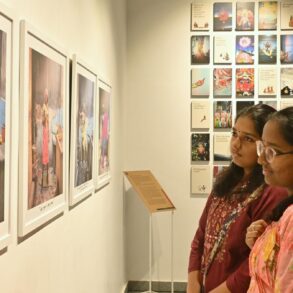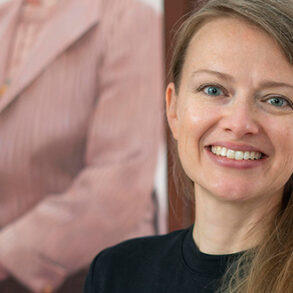An Indigenous artist has invited French woman Gisèle Pelicot to visit her remote community to learn more about the scarf she wore during her high-profile rape trial.
Ms Pelicot gained global support after publicly denouncing her husband’s 10-year campaign to drug and rape her alongside dozens of men.
In a lengthy hearing that began on Thursday evening Australian time, Dominique Pelicot sat emotionless in an Avignon courtroom as he was sentenced to 20 years in prison for orchestrating and committing the attacks on his wife.
He was convicted of the aggravated rape of Ms Pelicot and the wife of one of the co-accused, as well as taking indecent photographs of the other man’s daughter and daughters-in-law.
Throughout the trial, Ms Pelicot chose to wear a scarf, created by an Aboriginal artist in outback Western Australia, which was gifted to her as a gesture of love and solidarity.
The artist behind the scarf is Manyjilyjarra woman Mulyatingki Marney.
Martu artist Sylvia Wilson says Gisèle Pelicot is a strong woman. (Supplied: Sylvia Wilson)
Ms Marney is part of Martumili Artists, a group based in Newman, about 1,170 kilometres north-east of Perth.
The wearing of the scarf has become a source of pride for fellow members of the Martumili Artists group, including Martu woman Sylvia Wilson.
“There’s a really strong message, and what’s behind the scarf too,” Ms Wilson said.
The artwork is titled Wilarra, the Manyjilyjarra word for moon.
What’s behind the scarf
“It’s the place Wilarra, which is a healing place out on community,” Ms Wilson said.
“There’s that strong message about that cultural side of the story, then there are other women who wear the scarf as a fashion statement or to stand strong in their own voice.”
Ms Wilson said the older artist behind the work, Mulyatingki Marney, is an amazing woman.
“She’s got a great sense of humour and she’s still strong today,” she said.
Martumili Artists acting manager Rhianna Stewart says Martu art is far reaching. (ABC Pilbara: Charlie Mclean)
Martumili Artists acting manager Rhianna Stewart said their artists’ work tells important stories.
“I think the artwork that Mulyatingki Marney did is an expression of her own life, which has elements of struggle as a Martu woman living in the desert through a time of colonisation,” she said.
How a scarf from outback WA ended up in France
The scarf was purchased and sent to Gisèle Pelicot by the Older Women’s Network Australia — an organisation that works to promote the rights and wellbeing of older women.
“We felt there was an urgent need to express our solidarity for the incredible courage that she has shown in the face of the indescribable trauma that she was facing,” Older Women’s Network NSW chief executive Yumi Lee said.
The East Pilbara Arts Centre in Newman is a space for Martumili artists to create and exhibit artworks. (ABC Pilbara: Charlie Mclean)
Ms Lee said they specifically chose the artwork of an older female artist.
“We felt it was really important to have the artwork of an Indigenous artist to connect her to the 60,000 years of resilience and courage,” she said.
“We picked that particular painting also for its connection to healing.”
Message for Australia
Ms Lee said the trial had importance here in Australia.
“Over 87 per cent of women who experience sexual assault do not report it for a range of reasons, and if that woman is older the range of reasons expands even more,” she said.
Older Women’s Network NSW CEO Yumi Lee says the scarf was sent to express the group’s solidarity. (Supplied: Yumi Lee)
“So having Gisèle stand up and say that her trial has to be held in public and she will endure this under the full glare of the media and the public gives us an opportunity to talk about the issue, to say that the status quo is completely unacceptable, and things have to change.”
Sylvia Wilson from the Martumili Artists said reading about Ms Pelicot’s story was an emotional experience.
Gisèle Pelicot wears a scarf sent as a show of solidarity by a group that advocates for the rights of older women in Australia. (ZZIIGG via Reuters)
“She’s a strong woman and I would love for her to come to Newman and meet the artist and go to where the scarf’s from, where the painting was produced, and come on country,” Ms Wilson said.
“There are a lot of stories in Australia and also the world of different women, of what they are going through, and how resilient they are.”
Ms Wilson said Martu artwork was currently featured in exhibitions in Paris and Belgium and is regularly sold overseas.
“People love the stories and what it represents, and also the colours and what they see, so it’s all a mixture of what you get,” she said.
“But I think it’s about the story and keeping the Martu First Nation story strong for future generations.”







